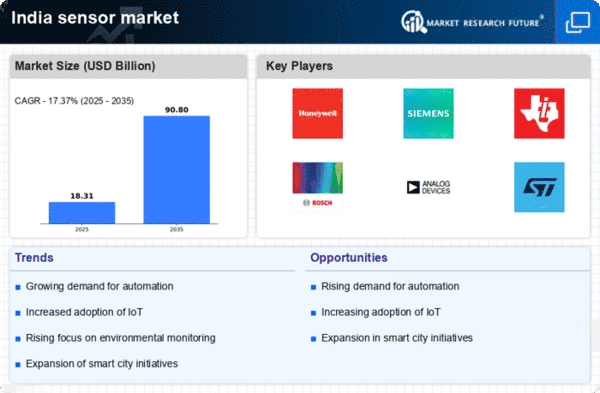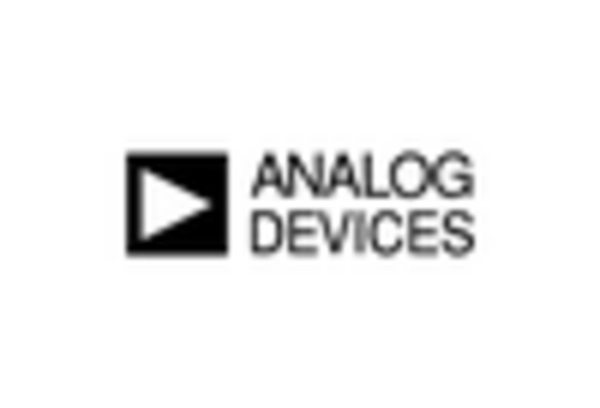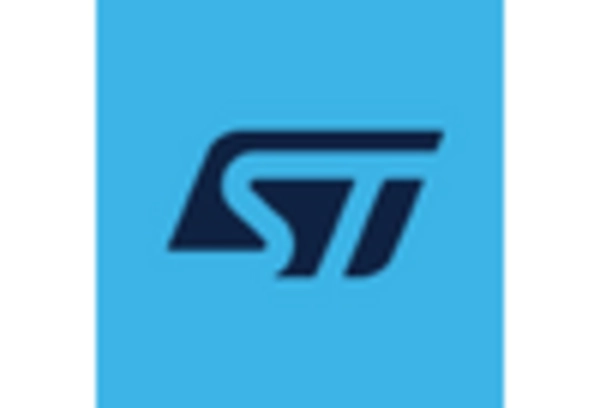The sensor market in India is characterized by a dynamic competitive landscape, driven by rapid technological advancements and increasing demand across various sectors such as automotive, healthcare, and industrial automation. Major players like Honeywell (US), Siemens (DE), and Bosch (DE) are strategically positioned to leverage their extensive portfolios and innovative capabilities. Honeywell (US) focuses on integrating advanced sensor technologies into smart building solutions, enhancing energy efficiency and operational performance. Siemens (DE) emphasizes digital transformation, utilizing IoT and AI to optimize manufacturing processes, while Bosch (DE) is heavily investing in automotive sensors, particularly for electric vehicles, indicating a shift towards sustainable mobility solutions. Collectively, these strategies not only enhance their market presence but also intensify competition, as companies strive to differentiate themselves through innovation and customer-centric solutions.
Key business tactics within the sensor market include localizing manufacturing and optimizing supply chains to enhance responsiveness to market demands. The competitive structure appears moderately fragmented, with several key players holding substantial market shares while also facing competition from emerging startups. This fragmentation allows for a diverse range of products and solutions, fostering innovation and driving down costs. The collective influence of established companies, alongside agile newcomers, shapes a vibrant ecosystem that encourages continuous improvement and adaptation to market needs.
In October 2025, Honeywell (US) announced the launch of a new line of smart sensors designed for industrial applications, aimed at improving predictive maintenance capabilities. This strategic move is significant as it aligns with the growing trend towards automation and data-driven decision-making in manufacturing, potentially enhancing operational efficiency for clients. By focusing on smart technologies, Honeywell (US) positions itself as a leader in the industrial IoT space, catering to the increasing demand for integrated solutions.
In September 2025, Siemens (DE) unveiled a partnership with a leading Indian tech firm to develop AI-driven sensor solutions for smart cities. This collaboration is crucial as it not only expands Siemens' footprint in the burgeoning smart city sector but also demonstrates a commitment to leveraging local expertise. Such partnerships are likely to enhance product relevance and accelerate deployment, thereby strengthening Siemens' competitive edge in the region.
In August 2025, Bosch (DE) expanded its manufacturing capabilities in India by investing €50 million in a new facility dedicated to automotive sensors. This investment underscores Bosch's commitment to the Indian market and its strategic focus on electric vehicle technology. By increasing local production, Bosch (DE) aims to reduce lead times and costs, thereby enhancing its competitive position in a rapidly evolving automotive landscape.
As of November 2025, current trends in the sensor market are heavily influenced by digitalization, sustainability, and the integration of AI technologies. Strategic alliances are increasingly shaping the competitive landscape, enabling companies to pool resources and expertise to innovate more effectively. Looking ahead, competitive differentiation is likely to evolve from traditional price-based competition towards a focus on technological innovation, reliability in supply chains, and sustainable practices. This shift suggests that companies that prioritize R&D and customer-centric solutions will be better positioned to thrive in the increasingly complex sensor market.
















Leave a Comment